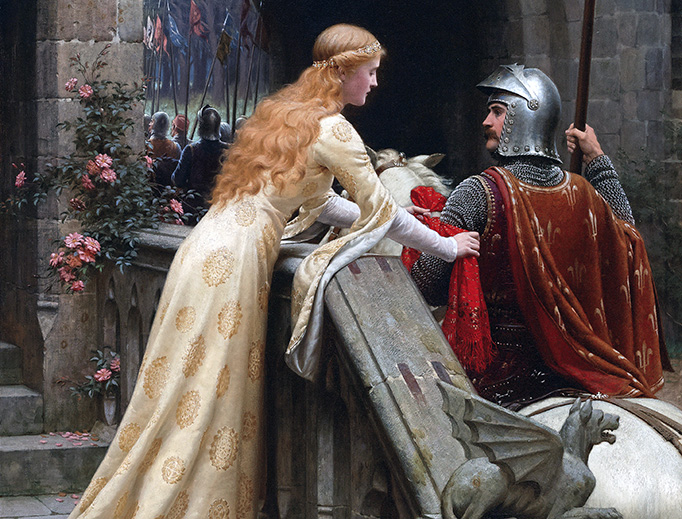Whatever Happened To Chivalry?
The best way to overcome the insanity of our own age is to look backward—to a time when chivalry mattered.

In his Introduction to Saint Athanasius’ On the Incarnation, C. S. Lewis cautions that we should not confine our reading exclusively to new books, but should intersperse “old books” as well. “Every age has its own outlook,” writes Lewis, and—try as we might to overcome it—all of us are more or less shaped by that outlook. That would be a distressing thought for a Christian in any era, but in our agnostic age the warning has particular urgency.
Lewis, however, offers us a way out: we can open the pages of old books, and thus open doors to old worlds.
Fancying myself a lifelong student of Professor Lewis, I’ve been reading The Book of Chivalry, by a 14th-century French knight, Geoffroi de Charny. In this old book, de Charny offers us a working model of chivalry, understood originally as the code of conduct for a Christian knight. This gentleman’s virtue includes the love of God, loyalty to the Catholic Church, the defense and honor of women, the protection of the helpless, the pursuit of wisdom, the development of physical prowess, the practice of mercy and empathy, the attainment of holy piety, continually striving toward perfection, and the rejection of materialism. Here’s a sample:
“You should not care about amassing great wealth, for the more worldly goods a man acquires, the more reluctant he is to die and the greater his fear of death...”
“Hence all good men-at-arms are rightly bound to protect and defend the honor of all ladies against all those who would threaten it by word or deed.”
“It is certain that it can and should be fitting that all these good men-at-arms don their armor in as pure and devout a way and with as good a conscience as should priests don the armor of Our Lord to sing the mass and conduct the divine service.”
As I read de Charny’s book, I kept thinking that his philosophy goes beyond mere medieval knighthood—this is a primer for Catholic manhood in any era. The practice of chivalric virtue requires neither armor nor lance. Hence, it prompts the questions: Whatever happened to chivalry? Does it still exist? How and when did chivalry go from being a noble aspiration to being offensive to independent women?
For some people, the disdain for chivalry is likely biased by a prior disdain for Christianity; after all, chivalry and Christianity are inextricably linked. We live in a post-chivalrous world because we live in a “post-Christian” world. Better to leave it all behind, some might think.
But maybe it’s even more basic than that. Besides Christianity, the only thing more associated with chivalry is masculinity; at the moment, nothing is more attacked than masculinity. Sometimes it seems that the only way men are depicted in popular culture is as effeminate best friends, as lotharios, or as exaggerated caricatures – heroes and demons.
This is why a return to true masculinity includes a return to the virtues of chivalry. De Charny would have agreed; and so would have C. S. Lewis. In his essay, The Necessity of Chivalry, Lewis praises knightly chivalry for promoting the largely unique ideal that a man can be a fierce and courageous warrior and—simultaneously—a humble, gentle, and merciful man. Lewis writes:
“The medieval ideal brought together two things which have no natural tendency to gravitate toward one another. It brought them together for that very reason. It taught humility and forbearance to the great warrior because everyone knew by experience how much he usually needed that lesson. It demanded valour of the urbane and modest man because everyone knew that he was as likely as not to be a milksop.”
…The man who combines both characters—the knight—is a work not of nature but of art; of that art which has human beings, instead of canvas or marble, for its medium.”
De Charny and Lewis would also agree that we men cannot allow ourselves or our children to be overly influenced by those dubbed “heroes” of the modern age: the politicians, the movie stars, and the millionaires who seem disinterested in living up to basic norms of decency, much less chivalry. Instead, to Lewis’ point, we can look back to men like de Charny who once existed here on Earth, and still exist in old books.
The best way to overcome the insanity of our own age is to look backward—to a time when chivalry mattered. We must look back, because we can’t (to anticipate a common and stupid retort) actually go back. We must be knights in shining armor, even if the world mocks knights; because if the Middle Ages needed knights, our own age needs them more. It is not simply that damsels are in distress; the whole world is in distress, largely because men are lacking the qualities that once defined knighthood. We need to bring those qualities back—to fatherhood, to the priesthood, to the world.












